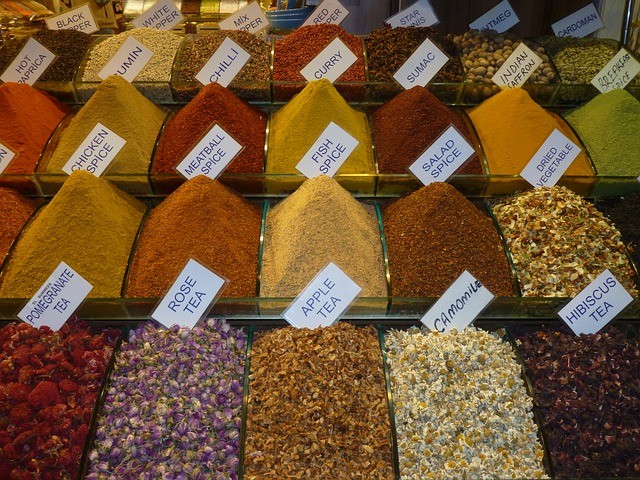Discover the best anticancer herbs that will surely be beneficial to you, your friend and family. Check out the article we found over at Herbs Info.
Introduction
The subject of anticancer herbs is certainly a controversial one. Opinions are polarized – with some strongly opposed to orthodox cancer treatments, and some strongly opposed to herbal medicine.
A very significant amount of scientific research has been done in the investigation of anticancer properties of various plants – however much work still needs to be done.
The purpose of this page is neither to attempt to persuade, nor to debunk – but simply to present as much good information as possible on the subject, in order that the person interested in the possibility of anticancer herbs may be assisted in “doing their homework”. See this page as a “starting point” for research or investigation. I’ve done my best to cite references that I have found. It is written in the small print at the foot of this page in greater detail, but it is expedient to repeat it: This page is not medical advice, nor is it intended to substitute for professional medical consultation.
Note – this page uses the term “anticancer” with a broad brush; and it is the most widely-used term – however please note that the National Cancer Institute considers that the term “anticancer herb” is not accurate enough. Their definition gives three terms: cytotoxic – action against tumors in vitro (i.e. in laboratory cell cultures); anti-tumor – toxic to tumors in animals; anti-cancer – action against tumors in human trials.
Mechanisms by which herbs may fight against or have a preventative effect on cancer are varied and the science complex. Some herbs may act as “immunomodulators” – stimulating the immune system to fight against cancer cells. Others may have a direct cytotoxic action – however this does not necessarily mean they should immediately be used; as an agent that has been shown to be toxic to cancer cells may also be toxic to healthy cells. Some herbs (such as Milk thistle) have been found by studies to act selectively against cancer cells and this is considered a highly desired quality.
One of the challenges of the work against cancer is that there are so many factors which may influence it, that it becomes difficult to pin down both actual causes and beneficial agents in real life. I for one would welcome large scale “big data” type research which might more easily detect correlations between lifestyle, dietary and supplement factors with incidence of cancer. A future project for the world to consider? We now have the technology.
With the above said, on to our list of over 60 herbs and plants for which anticancer properties have been reported / claimed. This page has officially turned into a mammoth tome and we have done our best to cite all references. I hope this information is of benefit to you. Let’s work together to fight against this tragic disease. Suggestions are welcomed; please see the foot of the page for contact information.
Aloe vera
Aloe vera is celebrated for its varied pharmacological properties and therapeutic uses, one of which being a promising treatment for certain types of cancers. A systematic review of Aloe vera had accumulated a good amount of data from extensive literature search on dermatology studies and clinical trials and supports the use of Aloe vera as a candidate for photodynamic therapy of some kinds of cancer.
Aloe vera also contains a substance known as 1,8-dihydroxy-3-[hydroxymethyl]-anthraquinone (or simply AE), which has been proven to induce cell death among T24 cells (human bladder cancer cell line). AE has notable anticancer effects and inhibits cell viability while stimulating the arrest of G2/M of the cell cycle.
Asafoetida (Ferula asafoetida)
Ferula is a perennial herb commonly found in Afghanistan mountains but is also cultivated in nearby India. It contains ferulic acid, an antioxidant with anti-inflammatory activities and synergistic protective action against oxidative stress in skin and, by extension, photoaging and skin cancer. It also has alpha-pinene and luteolin, two compounds that have anticancer properties.
Bitter Melon (Momordica charantia)
Evidences about the anticancer properties of bitter melon are vast. In a 2010 American study, bitter melon extract was effective against human breast cancer cells and primary human mammary epithelial cells. It was able to reduce the proliferation of cancer cells and induce cell death among breast cancer cells.
Aside from breast cancer, the administration of bitter melon has also been proven beneficial for cervical and prostate cancer patients. Bitter melon can remarkably increase the number of natural killer (NK) cells, which is usually low or reduced in cervical cancer patients who have a defective immune system. Its administration also results in the arrest of the cell cycle among prostate cancer cells and halts the progress of prostate tumor.
Blackberry Bush
Blackberry bush owes much of its anticancer property to its ellagic acid content. Ellagic acid is a phenol antioxidant that can induce cancer cell death through apoptosis associated with decreased ATP production. More importantly however, this apoptotic activity comes without any toxic effect on the viability of normal human lung fibroblast cells. Ellagic acid expresses selective cytotoxicity and anti-proliferative activity as well.
Blackberry (Rubus, Rubus vulgaris, Rubus fruticosus)
Recent pharmaceutical research indicates that a daily dose of blackberries might prevent cancer. Blackberries contain anthocyanins – which have anti-inflammatory and anti-oxidant properties. According to findings presented by the University of Kentucky, the anthocyanins found in blackberries may have the potential to inhibit cancer cell growth and to kill existing cancer cells.
Naturally occurring in fruits such as blackberries, anthocyanins are not produced by the human body. While the addition of fresh blackberries, or blackberry jam, into your daily diet can increase your body’s defense against free radicals, the most efficient way to unleash the fruit’s disease-fighting power is to take blackberry extract in capsule form so that the anthocyanins are not immediately digested (and thus will be delivered to the gastrointestinal tract).
Chamomile (Matricaria)
Chamomile contains chemical constituents with anticancer properties. One of these is apigenin, a plant flavone with antioxidant and anticancer activities. It is principally linked to a decreased cancer risk, especially to cancers of the breast, digestive tract, skin, prostate, and blood.
Clove (Syzygium aromaticum, syn. Eugenia aromaticum or Eugenia caryophyllata)
Clove pertains to the dried flower buds of a tree native to Indonesia, India, Pakistan, Sri Lanka, Madagascar, and Zanzibar, and clove oil has been studied for its potential to improve immune function, which correlates with cancer prevention. According to the American Pharmaceutical Association’s Practical Guide to Natural Medicines, clove oil appears to have antioxidative properties and might have potential as an anticancer agent. However, more research must be carried out before any definitive claims can be made. On the oxygen radical absorbance capacity (ORAC) scale, pharmaceutical-grade clove oil measures at 1,078,700 ute/100g; it has the highest concentration of antioxidant activity of any single ingredient tested by the ORAC. According to the American Cancer Society, there is no sufficient evidence to suggest that clove oil can assist in the prevention or treatment of cancer. However, its high antioxidant rating indicates that it is a powerful supplier of anthocyanins, which can inhibit the growth of tumors and existing cancer cells.
Dandelion (Taraxacum officinale)
There is encouraging evidence that dandelion (Taraxacum) inhibits the growth and development of a wide range of cancer types and influences their metastasizing behavior.
Dandelion leaves are used by practitioners of both Ayurvedic and Chinese medicine to treat cysts and abscesses, water retention and tumors.
A 2008 study provided scientific data on Taraxacum officinale that highly suggest that dandelion extracts or their constituents exert anticancer activities. In this study, three aqueous extracts prepared from the mature dandelion leaves, flowers, and roots were investigated for their activities on tumor progression and invasion. The results of this study had demonstrated that dandelion leaf extract suppresses the growth of MCF-7/AZ breast cancer cells in an ERK-dependent manner and blocks the invasion of LNCaP prostate cancer cells into collagen type I. On the other hand, dandelion root extract blocks the invasion of MCF-7/AZ breast cancer cells.
The flower extract of dandelion also holds striking antioxidant activity in both biological and chemical models, as shown in a 2005 Canadian study in which extended lag phase and reduced propagation rate were observed in the oxidation of linoleic acid emulsion plus dandelion flower extract. In this study, the extract from dandelion had suppressed superoxide and hydroxyl radicals. These results translate to dandelion being a potential novel anticancer agent.
Echinacea
Of the nine different species of Echinacea, only three, namely, E. purpurea, E. angustifolia, and E. pallida, are used in marketed products. Native to North America, E. angustifolia was used by the Plains Indians to aid in preventing exhaustion. Other tribes used E. angustifolia to treat headaches and sore throats.
Echinacea can be purchased in capsules, tinctures, and teas. It can also be purchased as a liquid extract. All three commonly sold varieties of Echinacea are thought to have antifungal, antibacterial, and antiviral properties. Used to protect against sun damage, Echinacea is thought to be effective in preventing skin cancer. E. purpurea was commonly used by physicians to treat infections until it fell out of popularity in favor of antibiotics. Today, Echinacea is sometimes administered by physicians to cancer patients as a supplement to the normal course of treatment.
Ginger Root (Zingiber officinale)
Results from pharmacological experiments indicate that ginger might inhibit the growth of tumors in humans. [1] Gingerol, the active component in ginger, has been the focus of clinical trials determining its potential to prevent certain cancers. Researchers determined that in cases of ovarian cancer, administration of gingerol contributed to cancer-cell death. [2] In cases of ovarian cancer, gingerol was found to reduce inflammation and boost immune function. It has been stated by researchers that gingerol might protect against colon cancer.
Read full article: Anticancer Herbs







Fitness Junkie
Dec 31. 2015
Very cool post.
Deb Kero
Feb 21. 2016
Great Info in one Spot..
Juanita Byrd
Feb 22. 2016
Excellent!!
Donna Kelsey
Feb 22. 2016
Nice!